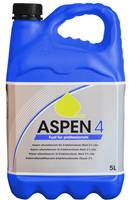Aspen 2 and Aspen 4 alkylate gasolines have been developed in cooperation with professional end users to reduce health risks and environmental hazards. Aspen 2 and Aspen 4 are almost completely free of harmful substances such as benzene, aromatic and polyaromatic hydrocarbons and olefins. Regular filling station gasoline contains approximately 100 different chemical substances, including aforementioned harmful substances, while Aspen alkylate gasoline only contains about 10 harmful substances. This means that with Aspen fuel health risks arising from gasoline fumes and exhaust gases are minimised.
Comparison with regular gasoline
Regular gasoline is manufactured by refining crude oil, during which different fractions are processed and mixed together. Gasoline isn’t just a single substance, but a mixture of many different substances. Regular gasoline one can buy from a filling station contains approximately 100 different substances, every one of which has a different effect on one’s health and the environment. Many components, however, are extremely hazardous to both people and the environment.
Alkylate gasoline is produced synthetically from pure residual gases obtained from refining crude oil. This produces an extremely pure gasoline, which contains only about 10 different substances and does not contain such harmful components as benzene, aromatic hydrocarbons, sulphur and olefins. Aspen alkylate gasolines have been developed in cooperation with professional end users primarily to reduce health risks and environmental hazards. This means that with Aspen fuel health risks arising from gasoline fumes and exhaust gases are minimised.
Hazardous substances
- Olefins – react in the body and form substances, which can cause cancer. Very volatile substance, contributes to the smoking of exhaust gases. Forms resins, reduces the shelf life of gasoline.
- Benzene – causes cancers such as leukaemia and is considered the most harmful substance in gasoline and exhaust gases. Accumulates in all living organisms.
- Aromatic hydrocarbons – may cause chronic nerve damage. Contributes to the smoking of exhaust gases. Accumulates in all living organisms.
- Sulphur – accumulates in acid form, hazardous for bodies of water.
- Carbon monoxide – very aggressive toxic gas, which diminishes lung function and leads to coughing, chest pains and breathing difficulties. Damages forests and may be the cause of forest die-off. Also hazardous to arable crops.




